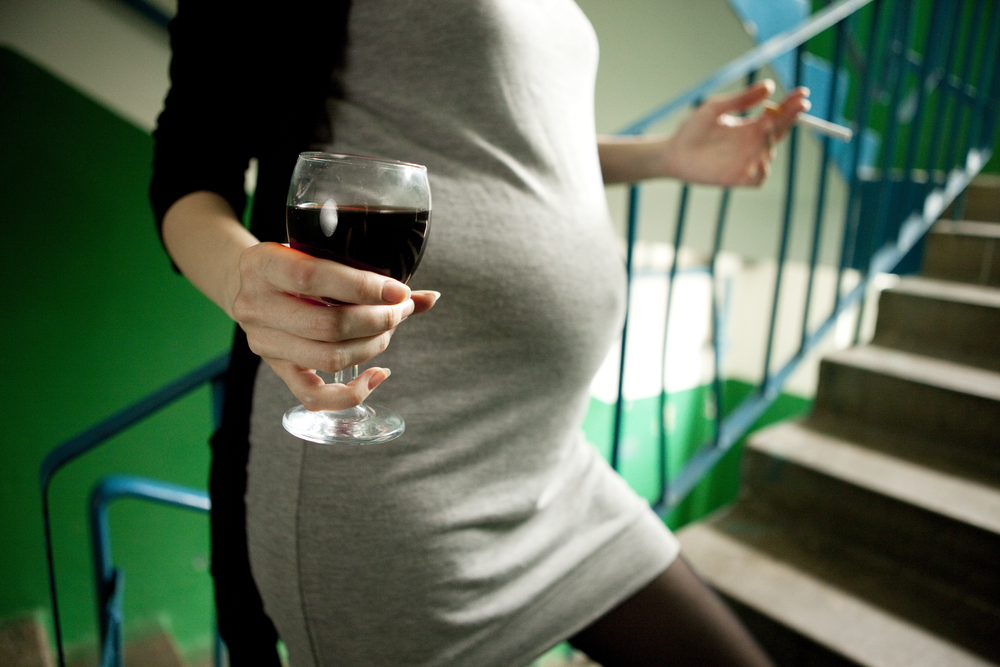
Drinking alcohol at any time during a pregnancy can cause serious health problems for a growing baby in the womb, such as fetal alcohol syndrome. Alcohol includes wine, wine coolers, beer and liquor. But binge drinking while pregnant is especially detrimental to a pregnancy. Binge drinking is defined as drinking four or more drinks in 2 to 3 hours.
When you consume alcohol during pregnancy the alcohol that is in your bloodstream quickly passes through the placenta and the umbilical cord to the fetus. The placenta is what grows in the womb and supplies the baby with food and oxygen through the umbilical cord. Drinking any amount of alcohol at any time during pregnancy can harm the baby’s brain and other organs as they develop. No amount of alcohol has been proven safe at any time during pregnancy.
Drinking alcohol during pregnancy increases the baby’s chances of having a variety of problems that can affect them throughout their life.
Alcohol-Related Birth Defects
- Premature birth. Premature birth is when the baby is born before 37 weeks of pregnancy. Premature babies can have very serious health problems at birth and later in life.
- Brain damage and problems with both physical and mental growth and development
- Birth defects such as heart defects, deafness, and hearing problems or vision problems. Birth defects are basically health conditions that are present at birth and change the shape or function of parts of the body.
- Fetal Alcohol Spectrum Disorders (also known as FASDs). Children born with FASDs can develop a range of problems, including intellectual and developmental disabilities. These problems cause difficulties in learning, communicating, taking care of themselves, and getting along with others. They also may have problems or delays with physical development. Binge drinking during pregnancy increases your chances of having a baby with FASDs.
- Low birth weight, also called LBW. This is when a baby is born weighing less than 5 pounds, 8 ounces.
- Miscarriage is when a baby dies in the womb before 20 weeks of pregnancy.
- Stillbirth. This is when a baby dies in the womb after 20 weeks of pregnancy.
If you don’t drink alcohol during pregnancy, the baby can’t be born with FASDs or any other health problems caused by alcohol. If you’re pregnant or even thinking about becoming pregnant, don’t drink alcohol.
It is possible that some women may drink alcohol during pregnancy and have babies who appear to be healthy. Some women may drink very little alcohol during pregnancy and have babies with serious health conditions. Every woman and every pregnancy is different. Alcohol may hurt one baby more than another. The best way to keep a baby safe from problems caused by alcohol during pregnancy is not to drink any alcohol whatsoever when pregnant.
You may want to drink alcohol during pregnancy, especially if you think you may be suffering from alcoholism. Alcohol is often part of social activities like parties and you may be used to having a glass of wine with dinner or at the end of a busy day. Giving up alcohol during pregnancy can be hard. But it is possible, especially with the help of alcohol detox and rehab.
We make it our top priority at Restore Health and Wellness LA to understand every aspect of alcoholism and alcohol addiction treatment. Community support, detox, luxury accommodations, inpatient and outpatient treatment programs, outdoor activities, holistic treatments, and volunteering, all supported by diverse forms of therapy and licensed professionals, is what you will find here with us. Our alcohol detox and alcohol rehab is modern and holistic. Your addiction recovery process will be tailored specifically to your needs with a combination of traditional and alternative therapies. Visit our alcohol rehab center in Calabasas, CA at 6918 Owensmouth Ave Canoga Park, CA 91303. 24/7 Admissions (818) 722-9019. On-Site Contact (818) 806-3914.












